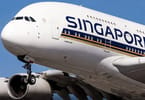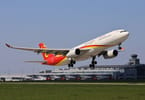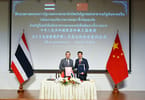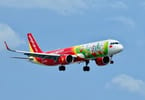CHICAGO, IL – Aircraft lessors around the world continue to benefit from increased air travel, strong airline profitability, low interest rates and generally accessible funding markets, according to Fitch Ratings’ latest North American FI Chart of the Month and Aircraft Leasing Sector Review report. As the reports highlight, however, these variables are cyclical in nature or prone to temporary disruption, limiting the potential for accompanying positive rating actions.
Global air passenger traffic, which underpins demand for commercial aircraft, grew 6.5% in 2015 and 6.0% in the first half of 2016 (1H2016), as measured in revenue passenger kilometers (RPKs), according to the International Air Transport Association (IATA). IATA projects a 6.2% RPK growth rate for 2016, while Fitch’s 2016 expected range for revenue passenger mile growth is 5%-6% globally.
“Current market conditions favor aircraft lessors given record manufacturer backlogs and capital constraints faced by certain airlines,” said Sean Pattap, Senior Director, Fitch Ratings. “Even as air travel increases globally, airline profits remain sensitive to oil prices and geopolitical risk in certain areas of the world, most recently the United Kingdom, Turkey and Latin America.”
Aircraft lessors’ credit ratings are supported by strong franchise positions, capable management teams, improving fleet and funding conditions, and acceptable leverage ratios relative to ratings. Ratings on the sector are constrained by the monoline focus on aircraft assets, reliance on wholesale funding, the cyclicality of the aviation industry, and potential residual value risk.
The debt markets for aircraft lessors remain accommodative and aircraft lessors benefit from diverse funding sources including the capital markets, commercial banks, insurance companies and government-sponsored export credit agencies globally.
“Low oil prices have boosted airline profitability and lessor utilization rates, and kept repossession activity low, but if oil prices remain depressed for a longer period of time this could further enhance airlines’ financial flexibility and reduce their leasing appetite,” added Pattap.
The two largest aircraft lessors are GE Capital Aviation Services and AerCap Holdings N.V. Fitch notes, however, that Asian firms are increasingly gaining market share. Earlier this year, Bohai Leasing Co., Ltd., which is majority-owned by the Chinese conglomerate HNA Group, rose to the top 10 global aircraft leasing firms with its acquisition of Avolon Holdings Limited. In Fitch’s view, growth in the Asian aircraft leasing market can be attributed to Asian banks and governments making the industry a strategic priority but also to increased regulatory capital charges for U.S. banks that engage in aircraft leasing.
As competition heats up in aviation, more consolidation is possible in aircraft leasing with CIT Group Inc.’s ongoing exploration of strategic alternatives for its $10 billion commercial air business.
WHAT TO TAKE AWAY FROM THIS ARTICLE:
- In Fitch’s view, growth in the Asian aircraft leasing market can be attributed to Asian banks and governments making the industry a strategic priority but also to increased regulatory capital charges for U.
- Ratings on the sector are constrained by the monoline focus on aircraft assets, reliance on wholesale funding, the cyclicality of the aviation industry, and potential residual value risk.
- “Even as air travel increases globally, airline profits remain sensitive to oil prices and geopolitical risk in certain areas of the world, most recently the United Kingdom, Turkey and Latin America.






















